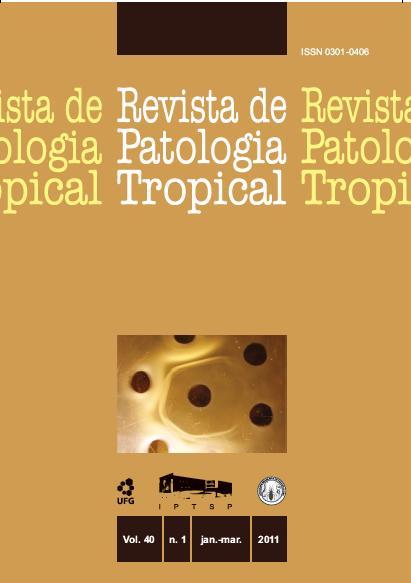Knowledge and beliefs about sexually transmitted disease and HIV/AIDS among adolescents and young people of state public schools of the West region of Goiania city, Brazil
DOI:
https://doi.org/10.5216/rpt.v40i1.13914Keywords:
Acquired Immunodeficiency Syndrome, Sexually Transmittable Infections, Sexual behavior, Adolescence.Abstract
Sexually transmitted infections (STIs) have a high prevalence constituting a publichealth problem throughout the world. Adolescents and young people are the population group most susceptible to STIs given their rate of unprotected sex. Our
aim was to investigate knowledge and beliefs about sexually transmitted infections/
HIV/AIDS among male and female adolescents and young people between 15
and 24 years of age attending public state schools in Goiânia’s West Region. We
carried out a descriptive, transversal study based on a self-applied anonymous
questionnaire. The questionnaire was applied in the second semester of 2009 to 210
students of six public primary and secondary state schools. The results demonstrate
an average knowledge of 77.0% in relation to AIDS; as for other STIs, the averages
were 42.4% for males and 57.4% for females. 95% of the students were aware of
the protection provided by the use of condoms. Data analysis allows us to state
that adolescents and young people of both sexes have an unsatisfactory level of
knowledge about STIs/AIDS and continue to hold erroneous beliefs that put them
at risk of AIDS and other STIs.
Downloads
Downloads
Published
How to Cite
Issue
Section
License
The manuscript submission must be accompanied by a letter signed by all authors stating the full name and email address, confirming that the material has not been published or is under consideration for publication elsewhere, and agreeing to transfer copyright in all media and formats for Journal of Tropical Pathology. The authors will not be paid for published articles. They are solely responsible for the content of those articles, even if the Editor holds the right to adjust them to the norms of the journal.
The reviewers will not be paid for the peer review process.

